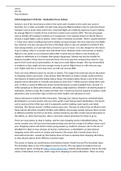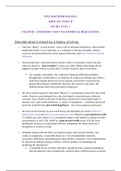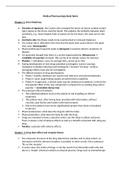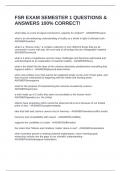1. Opposition to Russian rulers was more successful under the rule of the tsars then the
communist governments- how far do you agree? (25)
Introduction- give a brief overview of the main strands of opposition throughout the period,
what the situation looked like in 1855 compared with what the situation looked like in 1964 and
underline some of the main differences between the forms of opposition under the tsars and
that under the communists.
P1- agree with the statement focusing specifically on the success of communist opposition to
Nicholas II and how this eventually led to his abdication and eventual execution, mention how
successful the revolutionaries were as they managed to topple the regime they so despised.
Contrast this with the failure of opposition under Lenin, focusing on the civil war and how he
managed to hold onto the form of government he wanted for Russia and his success in applying
this to Russia as a whole and crushing all opposition. Contrast the success and activity of
opposition under Nicholas with the inertia and failure of opposition to Stalin, he was so effective
at crushing it that it almost didn’t exist- compare this with the extremely present and active
opposition under Nicholas.
P2- disagree with the statement, point out the lack of success of opposition under Alexander III
and how far it was pushed underground, compare this with the success of opposition under
Khrushchev- which was so successful that it eventually led to him being deposed by his own
party. Also point out that opposition under Lenin did indeed have some success- forcing the
abandonment of war communism and the adoption of the NEP.
P3- agree with the statement, highlighting the success of opposition under Alexander II, whilst it
may not have achieved much, the people’s will did achieve their ultimate aim insofar as they
killed the tsar- contrast this with the assassination attempt on Lenin in 1918, which was
unsuccessful and actually resulted in him being able to establish his power even more.
Reference also the failure of nationalist opposition to Khrushchev with the Hungarian uprising
which was easily crushed in 1956 and draw some parallels between this and the success
Alexander II had in Poland, suggesting that the issue is not simply black and white.
Conclusion- broadly agree that opposition had more success under the tsars then the
communists- two of the tsars were killed by opposition movements, whilst only one of the
communists was removed and that was by his own party. Point out, however, that they were
both effective in crushing nationalist opposition, but that ultimately opposition had far less
success under the communists.
Throughout the period 1855-1964 opposition to the regime was a constant feature of
governance, ranging from the peasant based narodnik opposition to Alexander II, to the Marxist
revolutionaries who opposed Alexander III and Nicholas II, to the internal party opposition which
faced both Lenin, Stalin and Khrushchev. What is broadly the case is that the success of
opposition varied widely throughout the period, from the success of the peoples’ will in the
assassination of Alexander II in 1881, to the complete annihilation of both real and imagined
opposition under Stalin.
Where I strongly agree with the statement is in the case of opposition to Nicholas II, this took
the form of both liberal opposition from the Kadets in the Dumas, to the more extreme Marxist
SD party, to the narodnik-style SRs who waged a campaign of terrorism on the regime.
Throughout the reign, Marxist opposition grew, encouraged by the huge growth in towns and
cities brought by the great spurt with its 7.5% annual economic growth and reinforced by the
Stolypin reforms of 1906, Nicholas personally encouraged such opposition with his cursory
communist governments- how far do you agree? (25)
Introduction- give a brief overview of the main strands of opposition throughout the period,
what the situation looked like in 1855 compared with what the situation looked like in 1964 and
underline some of the main differences between the forms of opposition under the tsars and
that under the communists.
P1- agree with the statement focusing specifically on the success of communist opposition to
Nicholas II and how this eventually led to his abdication and eventual execution, mention how
successful the revolutionaries were as they managed to topple the regime they so despised.
Contrast this with the failure of opposition under Lenin, focusing on the civil war and how he
managed to hold onto the form of government he wanted for Russia and his success in applying
this to Russia as a whole and crushing all opposition. Contrast the success and activity of
opposition under Nicholas with the inertia and failure of opposition to Stalin, he was so effective
at crushing it that it almost didn’t exist- compare this with the extremely present and active
opposition under Nicholas.
P2- disagree with the statement, point out the lack of success of opposition under Alexander III
and how far it was pushed underground, compare this with the success of opposition under
Khrushchev- which was so successful that it eventually led to him being deposed by his own
party. Also point out that opposition under Lenin did indeed have some success- forcing the
abandonment of war communism and the adoption of the NEP.
P3- agree with the statement, highlighting the success of opposition under Alexander II, whilst it
may not have achieved much, the people’s will did achieve their ultimate aim insofar as they
killed the tsar- contrast this with the assassination attempt on Lenin in 1918, which was
unsuccessful and actually resulted in him being able to establish his power even more.
Reference also the failure of nationalist opposition to Khrushchev with the Hungarian uprising
which was easily crushed in 1956 and draw some parallels between this and the success
Alexander II had in Poland, suggesting that the issue is not simply black and white.
Conclusion- broadly agree that opposition had more success under the tsars then the
communists- two of the tsars were killed by opposition movements, whilst only one of the
communists was removed and that was by his own party. Point out, however, that they were
both effective in crushing nationalist opposition, but that ultimately opposition had far less
success under the communists.
Throughout the period 1855-1964 opposition to the regime was a constant feature of
governance, ranging from the peasant based narodnik opposition to Alexander II, to the Marxist
revolutionaries who opposed Alexander III and Nicholas II, to the internal party opposition which
faced both Lenin, Stalin and Khrushchev. What is broadly the case is that the success of
opposition varied widely throughout the period, from the success of the peoples’ will in the
assassination of Alexander II in 1881, to the complete annihilation of both real and imagined
opposition under Stalin.
Where I strongly agree with the statement is in the case of opposition to Nicholas II, this took
the form of both liberal opposition from the Kadets in the Dumas, to the more extreme Marxist
SD party, to the narodnik-style SRs who waged a campaign of terrorism on the regime.
Throughout the reign, Marxist opposition grew, encouraged by the huge growth in towns and
cities brought by the great spurt with its 7.5% annual economic growth and reinforced by the
Stolypin reforms of 1906, Nicholas personally encouraged such opposition with his cursory










